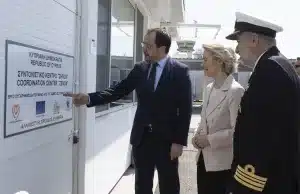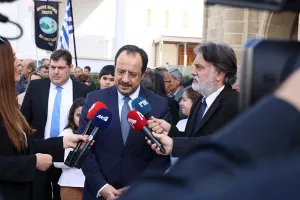A fresh multibillion-U.S. dollar coastal development deal between Egypt and the United Arab Emirates (UAE) will help to mitigate the North African country’s economic struggle and bridge its financing gap, according to Egyptian economists.
The two Arab countries reached a groundbreaking deal on Friday to build a new city on Egypt’s northern coast, in a bid to boost tourism, investment, and foreign currency reserves.
Under the deal, the UAE will inject 35 billion U.S. dollars in foreign direct investment into Egypt over the next two months, and the total investment is expected to reach 150 billion dollars throughout the project.
“This is the largest amount of FDI in the history of the country,” and the immediate payment will help the country overcome its current hard currency crunch, said Egyptian Prime Minister Mostafa Madbouly.
The deal enables the two countries to develop Ras Al-Hekma, a 170-square-km area west of Egypt’s Mediterranean city of Alexandria, into a new massive urban, business and tourism center, said a presidential statement on Friday.
With a payment of 24 billion dollars, the Abu Dhabi-based sovereign fund ADQ was granted the rights to develop Ras Al-Hekma. ADQ will also convert 11 billion of its deposits into investments in additional projects across Egypt to support its economic growth and development, the ADQ said in a statement.
At the signing ceremony, Madbouly said the deal was the start of several investment agreements that the government was working on to increase foreign currency sources.
“The deal constitutes a breakthrough in Cairo’s efforts to lure foreign direct investment and end its worst foreign exchange crisis,” Waleed Gaballah, a member of the Egyptian Association for Political Economy, Statistics and Legislation, told Xinhua.
Egypt has been dealing with a severe foreign currency shortage over the past few years due to declined tourism revenues during the COVID-19 pandemic, rising commodity prices and disrupted supply chains following the 2022 Russia-Ukraine conflict, and a recent plunge in the Suez Canal’s income amid surging conflict in the Red Sea, the economist said.
Abu Bakr al-Deeb, an advisor to the Cairo-based Arab Center for Research and Studies said the deal is expected to “generate big liquidity into Egypt,” a country actively pursuing additional funds to bridge its billions of financing gap.
Egypt has been selling stakes of state-owned assets and entering into new loan programs with foreign finance institutions, among other measures, to bridge its roughly 17 billion dollar financing gap by 2026, a number estimated by the IMF.
Under the deal with UAE, Egypt will also obtain 35 percent of the project’s revenues, Madbouly said, expecting the project to attract eight million tourists and create millions of job opportunities during and after its implementation.
Al-Deeb reiterated that the deal is significant because it will encourage other FDI and reduce the pressure on Egypt to obtain dollars.
Egypt’s dollar-denominated sovereign bonds jumped 1.4 cents on Friday after the deal was signed to trade at around 68 cents — its highest level in a year, according to data by Tradeweb, a financial company for trading fixed-income products.
Karim Adel, head of the Cairo-based Al Adl Center for Economic and Strategic Studies, believed Egypt is “an emerging stable market and capable of attracting foreign investments.” However, the country has “to stabilize its currency value against the U.S. dollars, to ensure investors when it comes to signing contracts,” Adel said.
Greenback price on Egypt’s black market has been hit sharply after the deal was announced. One dollar was exchanged on Sunday for 47 pounds instead of 63 on Friday morning. The official exchange rate stands at 30.8 pounds.




